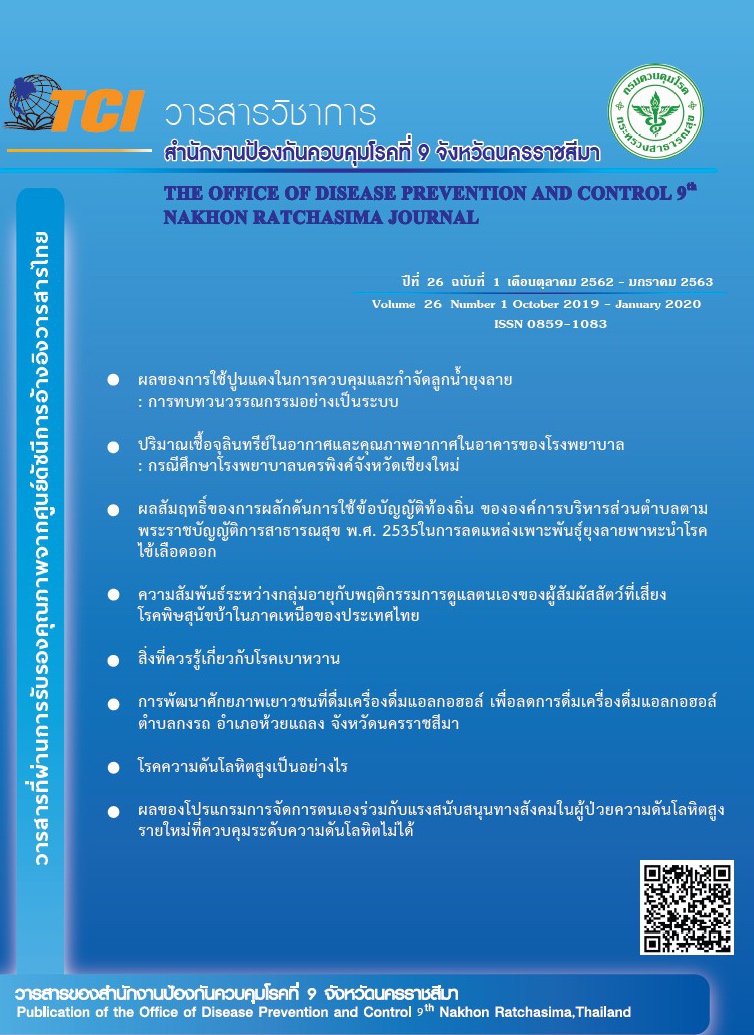The Effect of a Self-Management and Social Support Program on New Hypertension Cases with Uncontrolled Blood Pressure
Keywords:
new cases, Hypertension, self-management, social supportAbstract
This quasi-experimental research aimed to study the effectiveness of self-management with social
support programs in new cases of hypertension who have uncontrolled blood pressure levels. The patient must
be diagnosed with hypertension. The blood pressure (BP) have more than or equal to 140/90 mmHg for the
last 2 times. The patients have registered as a hypertension for not more than 6 months, but must be having
not a history of hypertension from elsewhere. The sample of this study was hypertension patients aged 18-60
years receiving services at the out-patient department of U-Thong Hospital, Suphanburi. The 60 samples were
randomly divided into the experimental group (n=30) and the comparison group (n=30). The study took a
total of 9 weeks. The experimental group was provided with the self-management and social support programs
consisted of problem solving. The activity was arranged 3 times in 1.5 hour sessions each at the hypertension
clinic, U-Thong hospital according to appointment system of the hospital. After the third activities, 5 minutes
telephone follow-up was used by the researcher to encouraged self-management behavior. Post-test was
conduct at the 1st week and 3rd weeks after intervention. The comparison group received
brochures about hypertension and routine health education by health care providers. The data
were collected by using questionnaires during the pre-post experiment and follow-up stage,
and was analyzed using descriptive statistics chi-square, repeated measure ANOVA, and
independent t-test. The results found that, the experimental group had significantly
better mean scores of self-management behavior to control blood pressure levels and blood pressure levels
(BP) better than pre-experiment and comparison group (p-value <0.05). It is suggested that the selfmanagement
and social support programs used with change of behavioral in self-management to control
blood pressure. It also uses the social support to help control the blood pressure levels of patients as well.
Highlight of the program is to have an appointment consistency with the hospital appointment system.
Patients are tracked through with network partners which the patients to participate in the activities as scheduled
and receive the complete program. That could be used with hypertensions new case to enhance their selfmanagement
skills affecting the blood pressure levels.
References
ในผู้สูงอายุโรคความดันโลหิตสูง. Rama Nurs J. 2557; 2:179-192.
2. ราเชษฐ เชิงพนม. พฤติกรรมส่งเสริมสุขภาพและคุณภาพชีวิตของผู้ป่วยเบาหวานที่มารับบริการที่คลินิก
เบาหวานโรงพยาบาลคลองหาด จังหวัดสระแก้ว. วารสารศูนย์การศึกษาแพทยศาสตร์คลินิก
โรงพยาบาลพระปกเกล้า.2551; 2:29-34.
3. เบญจมาศ ถาดแสง, ดวงฤดี ลาศุขะ, ทศพร คำผลศิริ. ผลของโปรแกรมสนับสนุนการจัดการตนเองต่อ
พฤติกรรมการจัดการตนเองและค่าความดันโลหิตของผู้สูงอายุที่มีโรคความดันโลหิตสูง.
พยาบาลสาร. 2555; 4:124-137.
4. Lorig KR, Holman HR. Self-management education: history, definition, outcome, and mechanisms.
Annu Behav Med. 2003; 1:1-7.
5. House JS. Work stress and social support. Reading, MA:Addison-Wesley; 1981.
6. สาธารณสุขจังหวัดสุพรรณบุรี. รายงานข้อมูลสถิติโรคความดันโลหิตสูง.แผนยุทธศาสตร์โรงพยาบาลอู่ทอง; 2560.
7. สาสินี เทพสุวรรณ์, ณัฐจีรา ทองเจริญชูพงศ์, รศรินทร์ เกรย์. ปัจจัยที่ส่งผลต่อความเครียดและ
ความสุขของการดูแลผู้สูงอายุ. วารสารประชากร. 2556; 1:75-92.
8. Papalia, D.E. & Olds, S.W. Human Development. 6th ed. New York: McGraw Hill Inc; 1995.
9. อภัสริน มะโน. ประสิทธิผลของโปรแกรมการประยุกต์ทฤษฎีแรงจูงใจในการป้องกันโรคร่วมกับแรง
สนับสนุนทางสังคมในการป้องกันความดันโลหิตสูงในชายวัยกลางคนเขตกรุงเทพมหานคร.
วิทยานิพนธ์ปริญญามหาบัณฑิต สาขาวิชาเอกพยาบาลสาธารณสุข. มหาวิทยาลัยมหิดล. 2550.
10. Lorig KR, Ritter P, Stewart AL, Sobel DS, Brown BW, Bandura A, González VM, Laurent D D,
Holman HR. Chronic Disease Self-Management Program: 2-Year Health Status and
Health Care Utilization Outcomes. Medical Care. 2001; 11:1217-1223.
11. จรูญศรี มีหนองหว้า. ความหมายและการจัดการภาวะซึมเศร้าของบุคคลที่เป็นโรคเบาหวานที่ควบคุม
โรคไม่ได้ในสังคมวัฒนธรรมอีสาร: การศึกษาเชิงปรากฏการณ์วิทยา. วารสารพยาบาลกระทรวง
สาธารณสุข. 2556; 1.
12. ดุษฎี พงษ์อุดม. ความสามารถในการดูแลตนเอง แรงสนับสนุนทางสังคม และความเครียดของผู้ป่วย
โรคความดันโลหิตสูงของโรงพยาบาลเมคคอร์มิค จังหวัดเชียงใหม่. วิทยานิพนธ์สาธารณสุขศาสตร
มหาบัณฑิต. เชียงใหม่: มหาวิทยาลัยเชียงใหม่; 2549.
13. จันทิมา เนียมโภคะ. โปรแกรมการสร้างเสริมสุขภาพสำหรับผู้ป่วยโรคเบาหวานชนิดที่ 2 ที่ไม่
สามารถควบคุมระดับนํ้าตาลในเลือด. วิทยานิพนธ์วิทยาศาสตรมหาบัณฑิต (สาธารณสุขศาสตร์).
สาขาวิชาเอกการพยาบาลสาธารณสุข, กรุงเทพ: มหาวิทยาลัยมหิดล; 2552

Downloads
Published
How to Cite
Issue
Section
License
บทความที่ลงพิมพ์ในวารสารวิชาการสำนักงานป้องกันควบคุมโรคที่ 9 จังหวัดนครราชสีมา ถือว่าเป็นลิขสิทธิ์ สำนักงานป้องกันควบคุมโรคที่ 9 จังหวัดนครราชสีมา



